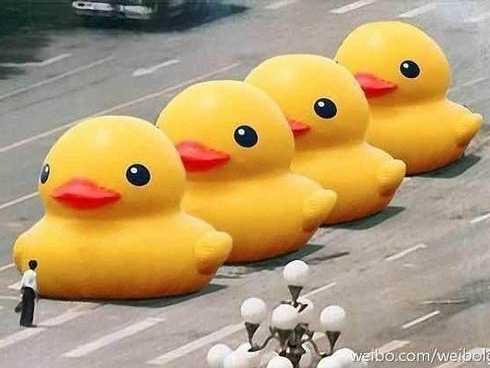
Image credit: Know Your Meme
In my last two posts, I suggested that internet memes carry a precarious relationship to history because a general principle of most internet memes is their detachment from an original setting (see: Casually Pepper Spray Everything Cop and Nina Gouvea em Desastres). In this post, however, I’ll explore an instance in which an internet meme became one of very few access points to a nation’s history.
In China, what has been referred to as the "Great Firewall” prevents the country’s citizens from learning about historical and global events online. On this year’s anniversary of the Tianamen Square Protests of 1989, also known as the June Fourth Incident, Chinese search engines blocked the words “today,” “tonight,” “June 4,” and, curiously, “Big Yellow Duck.” Though the Chinese government has done their best to censor history, knowledge of the June 1989 massacre of protestors is still spread through covert means. In the first week of June of this year, the anniversary of the protests and subsequent massacre, fliers were dispersed from a bus passing through Tianamen square and Beijing-based AIDS activist Hu Jia called for the coordinated donning of a black t-shirt. The most highly-discussed battle to preserve Chinese history, however, was waged through internet memes. Throughout the first week of June (when the 1989 massacres and protests occurred) a number of memes imitating the iconic Tank Man photo were featured on various Chinese web sites. On June 1 (the day the Tianamen Square massacre began) the Chinese site Netease featured an image of a Lego man facing down three Lego tanks. Another internet meme featured an image derived from “Angry Birds” giving three tanks the middle feather. The most popular incarnation of the Tank Man meme of all was the Big Yellow Duck meme, which appeared on the Chinese microblogging site, Sina Weibo.
The image features Tank Man facing down the People’s Liberation Army on June 5, 1985 (though it is called The June Fourth Incident protestors were active and under attack for several days before and after June 4). Instead of tanks, a row of three Photoshopped yellow ducks appear. The exact ducks we see Photoshopped into the image are from a popular sculpture in China, the six-story high "Rubber Duck" sculpture by Dutch artist Florentijn Hoffman which hovers in the waters of Victoria Harbor in Hong Kong. Not surprisingly, the Chinese government has approved the presence of the Rubber Duck sculpture -- it is, after all, a harmlessly blithe tribute to childhood. The placement of the sanctioned whimsical toy which looms over the city superimposed over the iconic Tank Man image places the horrific absurdity of censorship in relief. Here's to the spirited nature of Chinese netizen's brilliant resistance efforts, the "Big Yellow Duck" is one internet meme which truly does justice to history.
Most of the information from this post was drawn from the New York Times article “Censored in China: ‘Today,’ ‘Tonight’ and ‘Big Yellow Duck’” which can be found here: http://rendezvous.blogs.nytimes.com/2013/06/04/censored-in-china-today-tonight-and-big-yellow-duck/?_r=0

Recent comments
2 years 29 weeks ago
2 years 44 weeks ago
2 years 44 weeks ago
2 years 50 weeks ago
3 years 4 weeks ago
3 years 4 weeks ago
3 years 4 weeks ago
3 years 6 weeks ago
3 years 6 weeks ago
3 years 6 weeks ago